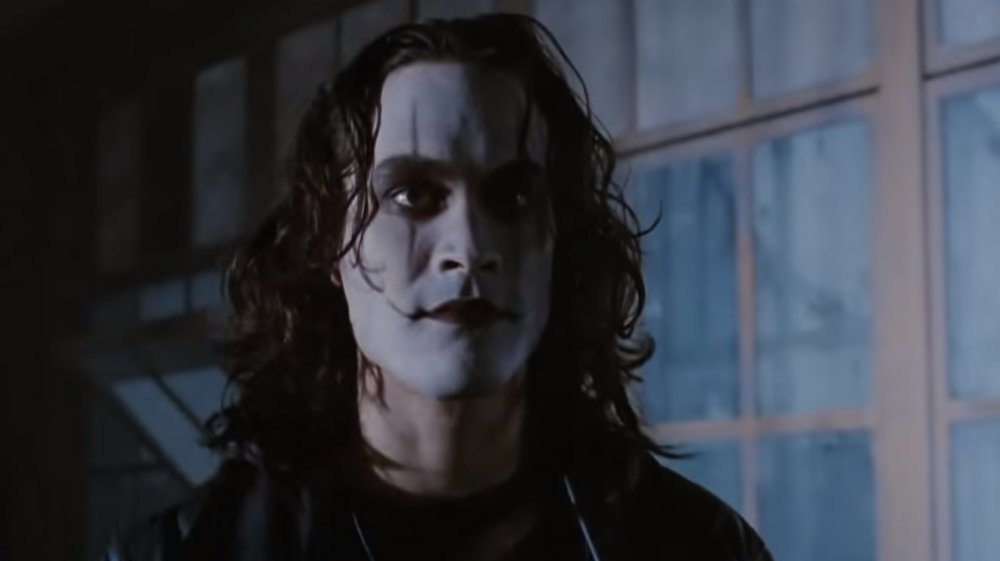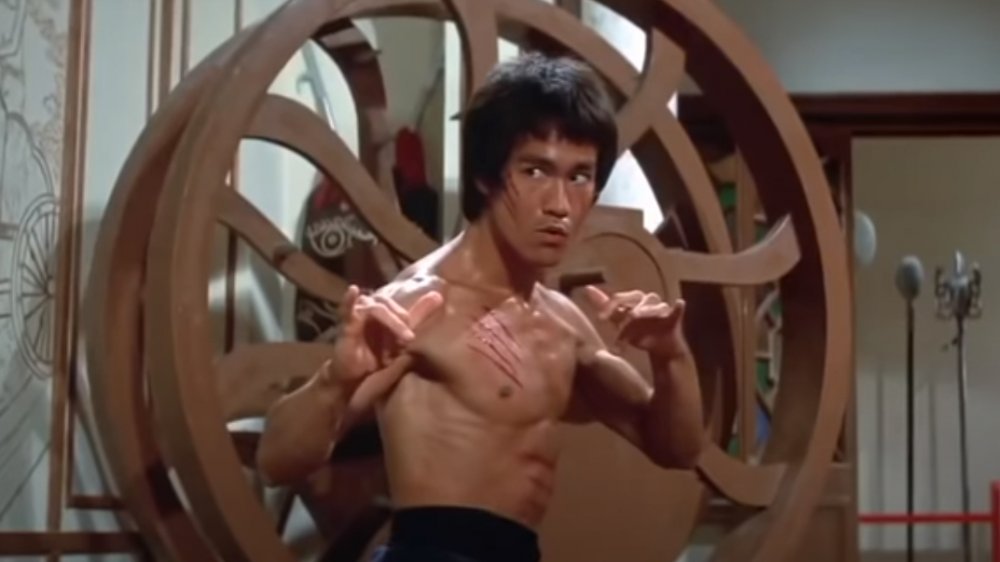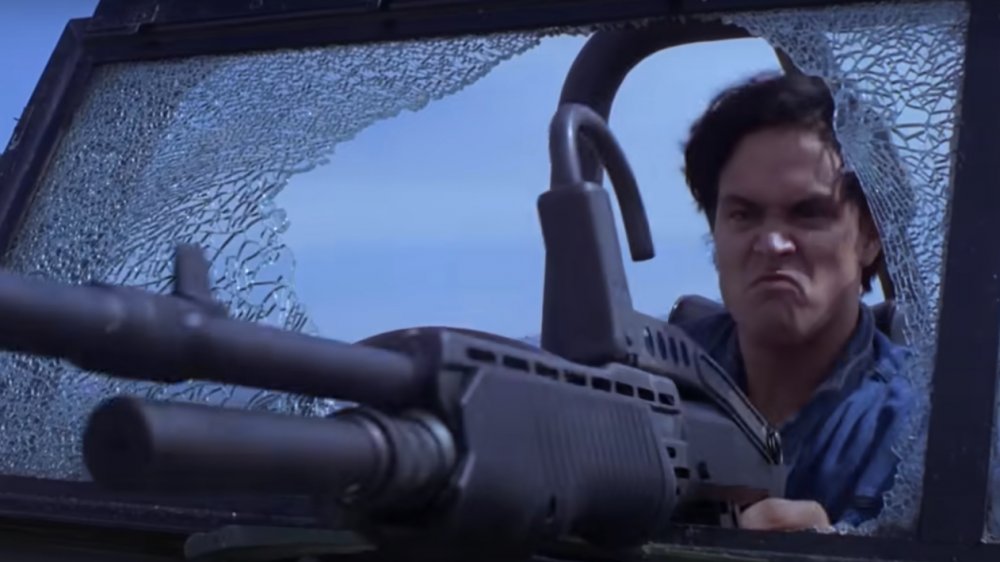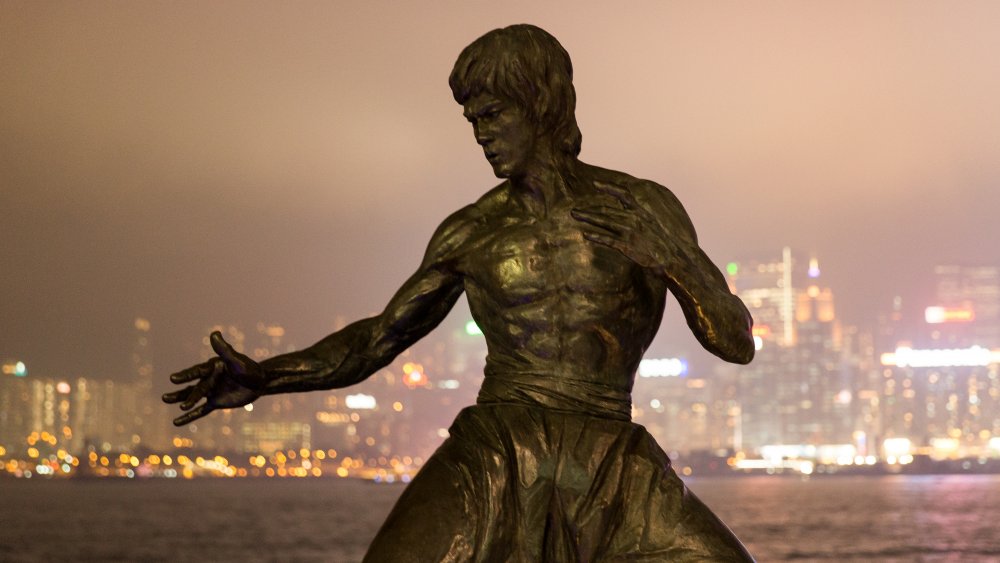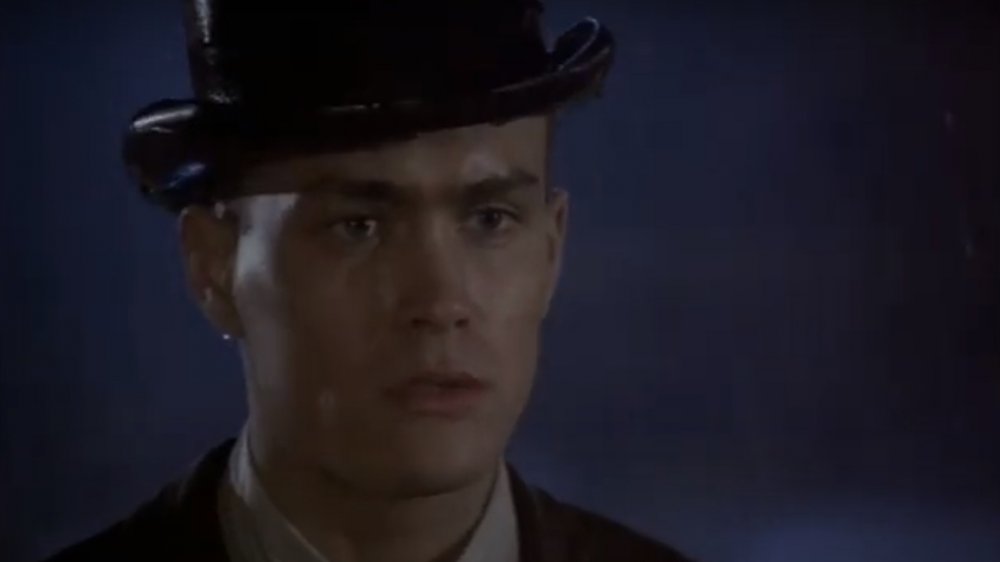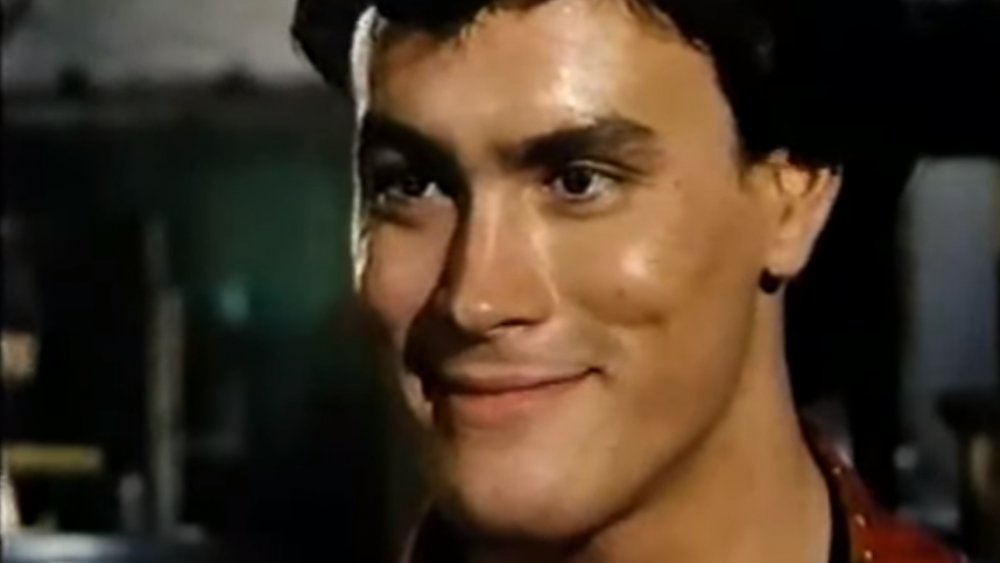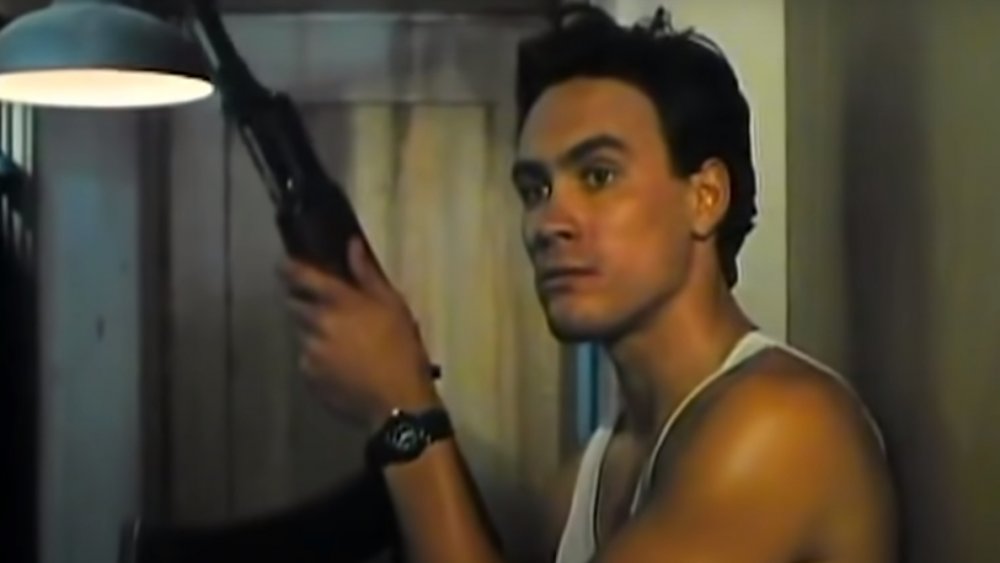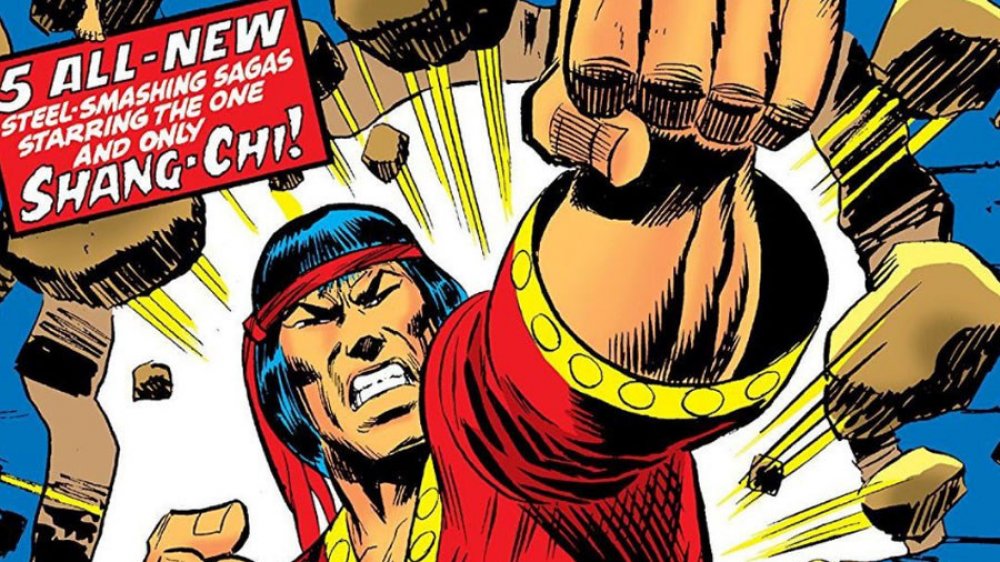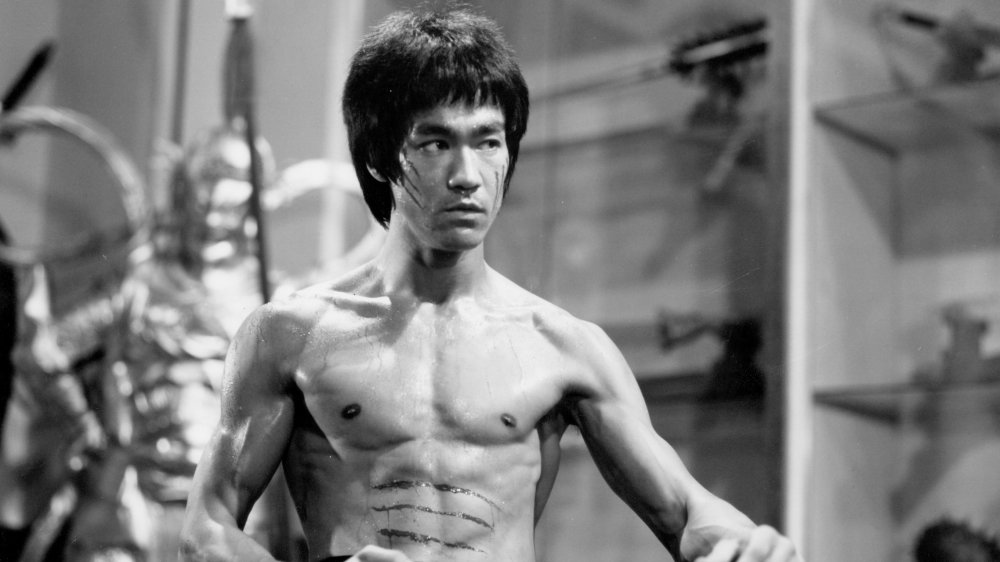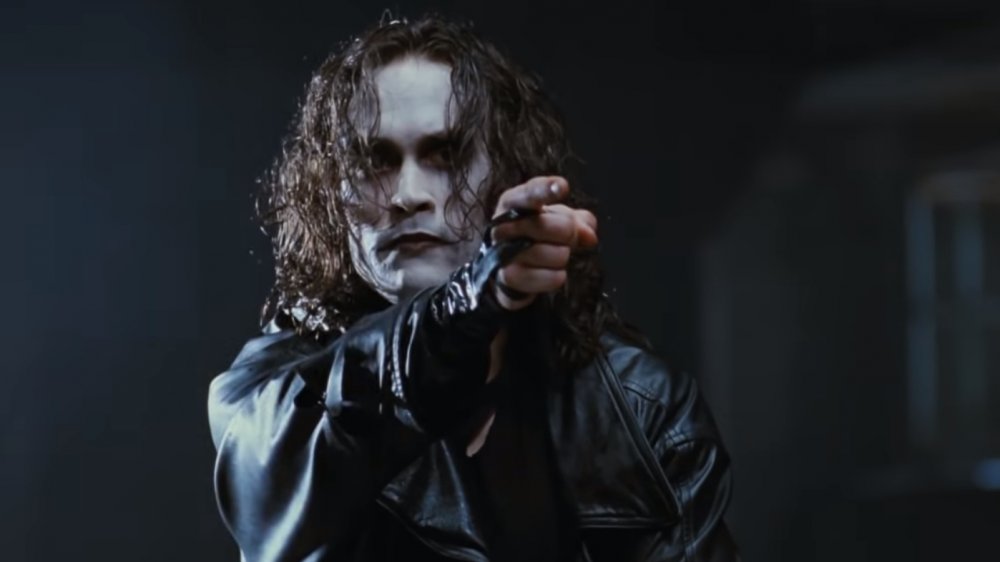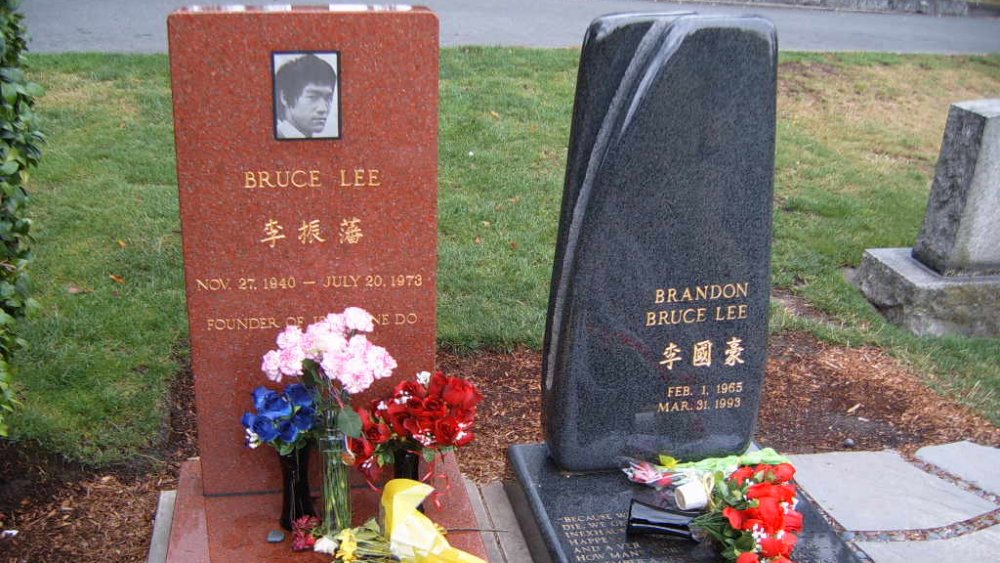The Tragic Real-Life Story Of Brandon Lee
Only 28 years old, Brandon Lee was on the verge of establishing his identity as an actor outside the shadow of his legendary father, martial artist Bruce Lee, when he was killed in a tragic accident on the set of The Crow on March 31, 1993. Based on James O'Barr's indie superhero comic about an avenging anti-hero who rises from the grave, The Crow should have been Lee's ticket to mainstream stardom outside the supporting roles and B action films he had languished in for most of his short career. Tragically, it proved a sad and ironic link to his father, who also died an early, controversial death. Although the film did make Lee a star, his last performance would be remembered more for the young actor's violent and wholly preventable end.
Above all, Brandon Lee's death is a tragedy of unrealized potential. Young, talented, and good-looking, he was already beginning to make inroads into the entertainment industry that would have been impossible for his Asian American father in the often intolerant 1960s and 1970s. Had he lived, could Brandon Lee have eclipsed his father's fame? We can only speculate based on the handful of television and film appearances that are his legacy. This is the tragic real-life story of Brandon Lee.
Brandon Lee lost his famous father at age eight
Brandon Lee was born February 1, 1965, in Oakland, California. The eldest of martial artist and actor Bruce Lee's two children, Lee was very close to his father. According to an April 1986 interview with the martial arts magazine Black Belt, the two had a playful relationship throughout Brandon's early childhood. "We used to goof around a lot together," Lee said. Nevertheless, the serious business of fitness and martial arts was always on his father's mind. "We worked out together and he would show me things. He was always training..."
Sadly, father and son never got the opportunity to get serious about martial arts. Lee recalled, "My dad and I used to talk about martial arts sometimes, and I remember thinking, 'I'll get a little older and dad will quit working quite so much, and he'll have more time...' I always assumed there would be a time when we began training more formally. Unfortunately, we never got to do that."
As recounted by History, Bruce Lee was 32 when he died of cerebral edema (swelling of the brain) in Hong Kong on July 20, 1973, under circumstances that remain shrouded in mystery. Following his father's passing, eight-year-old Brandon, his sister, and mother would move to Seattle. Lee would spend the rest of life in the shadow of his beloved father.
Brandon Lee was a rebellious teen
Growing up the child of the most famous martial artist of all time took an emotional toll on Lee. Having spent much of his childhood facing down schoolyard bullies anxious to get the best of Bruce Lee's son, Brandon's teen years were even more tumultuous. However, his adversaries were no longer wannabe tough guys. Authority itself became Lee's number-one enemy.
According to an article in People published shortly after his death, young Lee presented a serious discipline problem to the authority figures in his life. Kicked out of two high schools, Lee confessed to People in a 1992 interview that he "always had a pretty good knack for raising hell." According to Jim Spalding, Lee's former chemistry teacher at the Chadwick School in Palos Verdes, California, "He didn't need school, and he thumbed his nose at the rules." The charismatic Lee organized protests against the school administration, convincing his fellow students not to attend class. He would find himself expelled from the prestigious school in the spring of 1983, only a few months short of graduation, for misbehavior and insubordination. Among his most notorious high school antics, and the last straw for the faculty, was driving his car in reverse through oncoming traffic through the Chadwick School's campus.
Lee's penchant for hell-raising would abate as he matured. Nevertheless, he still had a wild side. Close friend Lou Diamond Phillips described the late actor as "a boiling mass of energy."
Brandon Lee was a high school dropout
Despite his rebellious ways and frequent clashes with authority, Lee was a highly intelligent student with an aptitude for English and writing. A feature on the official Bruce Lee website reveals the depth of the late action star's love of language and abilities as a writer. As revealed by Lee's sister, Shannon, he was a voracious reader who constantly carried a dictionary with him in case he encountered a word he didn't know. Most impressively, he got a perfect score on the English section of the SAT.
However, his language skills and love of books were not enough to trap the budding actor in the typical high school curriculum. Expelled from two high schools over discipline issues, Lee ultimately dropped out of a third. Still, he understood the value of a diploma and pursued a GED. Soon after, Lee left California to attend Emerson college in Boston but spent most of his time in New York pursuing his dream of becoming a serious dramatic actor. After a year, Lee left Emerson and returned to Los Angeles.
Brandon Lee's identity crisis
Brandon Lee had a keen awareness of his role as the son of Bruce Lee and struggled with it to varying degrees throughout his life. As a budding actor, Lee considered the consequences being the son of a celebrity might bring and contemplated keeping his parentage secret. "Yes, I think that I could share the fact that I am Bruce Lee's son with someone else. It is a fact that it is both a burden and a blessing, which one it is will be determined in years to come when I intend to share it with the whole world," the late actor once wrote. Despite his obvious love and admiration, his relationship with his father's legend inspired ambivalence and, often, suspicion in Lee. When asked about living in his father's shadow, Lee told Black Belt's Jim Coleman,"It used to be a real problem in my own head when I was younger. [...] I would be thinking 'Does this person like me, or is this person just screwing with me because I'm Bruce Lee's son?'"
Although he became an action star, following in his father's footsteps was the last thing on Lee's mind. Acting, not martial arts, was his main focus. Searching for his own identity, Lee avoided martial arts training for a time, putting all of his energy into becoming a serious dramatic actor. Nevertheless, his family name seemed to close more doors than it opened, at least when it came to the kind of roles Lee wanted.
Brandon Lee's ironic connection to his father
One of the many longstanding myths about Bruce Lee is that he developed the popular 1970s Western Kung Fu, and it was subsequently stolen from him by greedy TV execs. As Martial Journal reports in an article drawn from Matthew Polly's Bruce Lee: A Life, this conflated story is based largely on a treatment for a similarly themed martial arts Western that Lee had written called The Warrior, as well as the fact that he had been turned down for Kung Fu's lead role (along with a host of other Asian American actors including Star Trek's George Takei). Despite producer Fred Weintraub's initial enthusiasm for the martial artist, the distinctly Anglo actor David Carradine was cast as Kung Fu's exiled Shaolin monk Kwai Chang Caine.
Ironically, it would be a revival of Kung Fu that would give Brandon Lee his first break. Cast as Chung Wang, the illegitimate son of the original show's protagonist, Kung Fu: The Movie would pit Lee against Carradine in a convoluted revenge plot reminiscent of The Manchurian Candidate. Although Lee's presence in the movie is relatively small and barely makes use of his acting talents, his fighting ability is showcased to some effect. Speaking to Utah's Deseret News in 1992, Lee reflected on his acting debut: "I felt it was some kind of justice that it was my first film, since the original idea for the pilot was conceived for my father." Lee's sister, Shannon, would at last bring their father's original concept for The Warrior to Cinemax in 2019.
A missed shot at TV stardom
In 1987, just one year after his appearance in Kung Fu: The Movie, Lee would find himself once again involved in a follow-up to the 1970s TV hit, this time co-starring as young troublemaker Johnny Caine, the great-great-grandson of the original show's protagonist, along with David Darlow as his koan-spouting, kung fu master father. Unfortunately, the pilot for the proposed reboot titled Kung Fu: The Next Generation was an unqualified misfire. Although Lee has substantially more screen time, he's wasted in a supporting role opposite the frankly uncharismatic Darlow's weak impression of David Carradine in the original series.
Featuring a nonsensical plot involving arms dealers and a cameo appearance by the ghost of the original Kwai Chang Caine, Kung Fu: The Next Generation failed to generate network or audience interest. Airing only once as part of CBS Summer Playhouse, a showcase for unsold pilots that invited viewers to call in to decide the show's fate, Kung Fu: The Next Generation would be Lee's last major foray into television.
From cinematic accolades to B movies
Like his father, Brandon Lee would first find success in Hong Kong. Shot in 1986, just after his debut in Kung Fu: The Movie, Legacy of Rage, directed by Ronny Yu (who would later find success in the United States with the horror films Bride of Chucky and Freddy Vs. Jason), stars Lee in his first leading role as squeaky clean Brandon Ma, an average guy who's framed for murder by his drug dealer friend Michael Wan, portrayed by Michael Wong. Following eight brutal years in prison, Ma takes bloody revenge on his duplicitous pal and his gang. Packed with gunfights, car chases, and a simple good-guys-versus-bad-guys plot, Legacy of Rage was a hit with Asian audiences, earning its star a nomination for best new performer at the sixth annual Hong Kong Film Awards. Despite its international success, the film wouldn't be released in the United States until 1998, five years after Lee's death.
Lee's next leading film role would be the 1989 low-budget action flick Laser Mission. Cast opposite an aging Ernest Borgnine, Lee stars as a mercenary who's tasked with rescuing a scientist from the KGB. Shot as Soldier of Fortune, the film was released direct-to-video in 1990. Although it turned a profit, Laser Mission was critically panned and regularly turns up on lists of great bad movies. Lee would follow Laser Mission with the somewhat more successful Showdown in Little Tokyo with Dolph Lundgren and a breakout starring role in the action film Rapid Fire.
Brandon Lee might have been a Marvel movie star
According to an interview with former Marvel CEO Margaret Loesch on Inverse, Stan Lee wanted Brandon Lee to star as a live-action incarnation of Marvel's Shang-Chi in either a film or television series. Shang-Chi, who first appeared in Special Marvel Edition #15 in 1973, was created by Jim Starlin and Steve Englehart in response to the kung fu craze of the early 1970s following Marvel's failed attempt to obtain the rights to the popular TV show Kung Fu starring David Carradine. Conceived as the son of Dr. Fu Manchu, the popular villain created by 1920s pulp writer Sax Rhomer, Shang-Chi rebels against his father's evil ways to become a hero.
Loesch explains that Stan Lee had a particular affinity for the character. "Stan did believe in the character. He used that as an example of the comic that could transition into the movie and television world," Loesch explains. Brandon Lee caught the iconic comic mogul's eye in the late 1980s, and he called Brandon and his mother, Linda Lee Cadwell, in for a meeting to discuss potential Marvel characters the young actor could play. Stan Lee thought Brandon Lee was a perfect fit for Shang-Chi. "Stan had great hope [for Brandon]. He thought Brandon would be a future star," says Loesch. Nevertheless, the project never came to fruition.
Brandon Lee turned down the chance to play his father
Brandon Lee was offered the role of his father in the 1993 biopic Dragon: The Bruce Lee Story but turned it down, citing discomfort with the material. In an interview conducted by Britain's The Little Picture Show to promote Lee's film Rapid Fire, the actor explained his trepidation. "I was a little scared by the whole thing, really. It's strange to play your own father, you know? I couldn't really wrap my mind around it," said Lee. Career concerns and time also played a part in Lee's decision. "It's funny, too, because to tell you the truth, if it had come along later in my career, I might have more seriously considered it, but as it is, it is so early in my career, it's the kind of thing I just feel like it could be a career-ender," said Lee.
The role would go to Jason Scott Lee, who, in a 1993 New York Times interview, revealed that advice from Brandon Lee was integral to his success in the role. "Brandon said something that was very simple," the Dragon star recalled. "He said I wouldn't survive in this part if I treated his father like a god. He said his father was, after all, a man who had a profound destiny, but he was not a god." The film, released less than a month after the accident that would take Brandon's life, was dedicated to Lee.
Brandon Lee's tragic death was avoidable
The greatest tragedy regarding the accident that killed Brandon Lee is that it was avoidable. As reported by Entertainment Weekly, the scene seemed simple compared to many of the other action sequences in the film. Actor Michael Massee, as the villainous Funboy, was to fire a round from a .44-caliber revolver loaded with blanks. Lee, holding a grocery bag outfitted with a squib (a small explosive charge), was to react to the simulated bullet and fall. Initially, it seemed that Lee and Massee had nailed the scene. However, Lee did not get up.
Bleeding from a silver dollar-sized wound in his abdomen, the actor was rushed to the New Hanover Regional Medical Center in Wilmington, North Carolina, where he underwent five hours of surgery to repair the vascular and intestinal damage he'd suffered. Surgeons discovered what appeared to be a .44-caliber slug lodged in Lee's spine. Despite the doctors' best efforts, Lee passed away from massive blood loss. Somehow, a dummy slug used to make the prop weapon appear loaded for a close-up in a prior scene had lodged in the barrel, creating the equivalent of a real bullet. Unfortunately, weapons specialist J.B. Jones had been sent home prior to shooting the scene. No one had thought to check the weapon.
The wedding day that never was
As reported by Inside Edition, Lee was engaged to his longtime girlfriend Eliza Hutton at the time of his death. Their wedding was scheduled for April 17, 1993, just over two weeks after Lee's death. Lee's headstone would serve as a tribute to the couple's love. Etched into the black granite monument located in Seattle's Lake View Cemetery beside the red granite memorial that marks the final resting place of his father are the words "For Brandon and Eliza/Ever Joined In True Love's Beauty" followed by a passage from Paul Bowles' 1949 novel The Sheltering Sky that Lee quoted in one of his final interviews:
"Because we do not know when we will die, we get to think of life as an inexhaustible well, and yet everything happens only a certain number of times. How many more times will you remember a certain afternoon of your childhood that is so deeply a part of your being you can't even conceive of your life without it? Perhaps four or five times more? Perhaps not even that. How many more times will you watch the full moon rise? Perhaps twenty. And yet it all seems limitless."
The happy couple had the eerily fatalistic words printed on their wedding invitations.
Even in death, Brandon Lee couldn't escape his father's shadow
Brandon Lee will forever be linked to his father by his early death. As with any tragic, unforeseen event, there's an inevitable urge to make sense of seemingly inexplicable circumstances by finding links, connections, or conspiracies to explain away the unthinkable. Within days of his death, the press was connecting the imaginary dots between father and son.
Sadly, Brandon Lee's fate has become eternally intertwined with his father's, with countless books, magazine articles, and websites still attempting to draw parallels between the two. From rumors of a hit placed on father and son by organized crime to talk of black magic and family curses, the Lees' untimely deaths are an eternal source of speculation and exploitation. Some conspiracy theorists go as far as claiming that Brandon Lee's death was foretold in a scene in his father's film Game of Death in which the elder Lee is apparently shot while filming a scene for a movie. Although the many instances of coincidence and the similarities are eerie and interesting, in the end, they only serve to unfairly diminish Brandon Lee's life and career to a footnote in his father's legend.
